Easy Recipe for Crusty Stuffed Meatloaf Wellington Roll

Stuffed Meatloaf Wellington is a spectacular and delicious dish, perfect for Sunday lunch and special occasions. It is a delicious reinterpretation of the classic Beef Wellington, in this case substituted with a meatloaf wrapped in a crispy puff pastry crust. The dough, made with minced meat, bread, eggs and cheese, welcomes a filling of spinach and scamorza, for a result with a tender and stringy filling. The whole thing is covered with a golden puff pastry shell, tasty and decorative at the same time thanks to the particular weave.
The meatloaf is cooked with the cover already on directly in the oven, on the lowest level for about an hour: this way the inside will remain juicy and will cook to perfection, while the crust will become golden brown and crumbly. The meat used for the meatloaf dough is a mix of beef and a little turkey, for a tasty and not excessively heavy combination.
What is Stuffed Meatloaf Wellington?
Meatloaf Wellington, a creative twist on the classic Beef Wellington, combines the comforting flavors of meatloaf with the elegance of puff pastry. Originating as an adaptation of the traditional British dish, which features a beef fillet coated in pâté and duxelles, then wrapped in pastry, Meatloaf Wellington simplifies the recipe for everyday enjoyment. This version became popular as a way to elevate humble ingredients like ground meat into a visually stunning and flavorful centerpiece. Variations abound, from incorporating different meats like turkey, pork, or lamb, to adding fillings such as cheese, spinach, or mushrooms for extra richness. Vegetarian adaptations even substitute the meatloaf with lentil or vegetable-based mixtures, ensuring the dish’s appeal across dietary preferences.
Pro Tips for The Best Stuffed Meatloaf Wellington
- Allow the cooked or shaped meatloaf to cool completely before wrapping it in the puff pastry. This prevents the pastry from becoming soggy during baking.
- If adding extra fillings like cheese or vegetables, use them sparingly to avoid an overly bulky loaf that might tear the pastry.
- Use parchment paper or a silicone baking mat to prevent sticking and make cleanup easier.
- Allow the Meatloaf Wellington to rest for 10–15 minutes after baking. This helps the juices redistribute, making it easier to slice neatly.
What Else Can I Add to The Filling?
For the filling, we have opted for fresh baby spinach: tender and delicate, they can be used raw without requiring pre-cooking. You can enrich the meatloaf mixture with crumbled fresh sausage, for a stronger taste, while for the filling you can replace the baby spinach with classic spinach previously sautéed in a pan, then squeezed and chopped. Or you can use grilled or fried eggplants, peppers, zucchini for a colorful and tasty version, but also chicory and broccoli for a more marked and intense flavor.
How Do I Keep The Crust From Getting Soggy?
To keep the crust from getting soggy, make sure the meatloaf is completely cooled before wrapping it in puff pastry. You can also brush a thin layer of mustard or beaten egg onto the pastry's interior to create a barrier against moisture. Additionally, bake the Wellington on a lined tray with proper ventilation, and avoid overfilling with juicy ingredients.
Why is My Meatloaf Crumbly and Falling Apart?
The meatloaf might be crumbly and fall apart if it lacks proper binding agents like eggs or breadcrumbs, which help hold the ingredients together. Overmixing or using lean meat without enough fat can also result in a dry, fragile texture. Ensure the mixture is well-balanced and compacted just enough to maintain its shape without being overworked.
What Can I Serve This Stuffed Meatloaf Wellington With?
Meatloaf Wellington pairs beautifully with creamy mashed potatoes, roasted vegetables, or a fresh green salad. A rich mushroom or red wine gravy complements the dish perfectly, while steamed asparagus or buttered green beans add a light, vibrant contrast to the savory flavors.
Can I Make This Stuffed Meatloaf Wellington Ahead of Time?
Yes! Prepare the meatloaf and let it cool completely before wrapping it in puff pastry. Store it in the refrigerator for up to 24 hours before baking.
Does This Stuffed Meatloaf Wellington Freeze Well?
It does! Assemble the meatloaf wrapped in puff pastry, then freeze it unbaked on a tray until firm. Once frozen, wrap it tightly in plastic wrap or foil and store it in the freezer for up to 3 months. Bake directly from frozen, adding 15–20 minutes to the cooking time.
More Meatloaves to Try Your Hand At!
How to Store Stuffed Meatloaf Wellington
It is recommended to enjoy the meatloaf piping hot and fresh from the oven. If you have any leftovers, you can store it in the refrigerator, covered with a sheet of cling film, for 1-2 days.
Ingredients
How to Make Stuffed Meatloaf Wellington
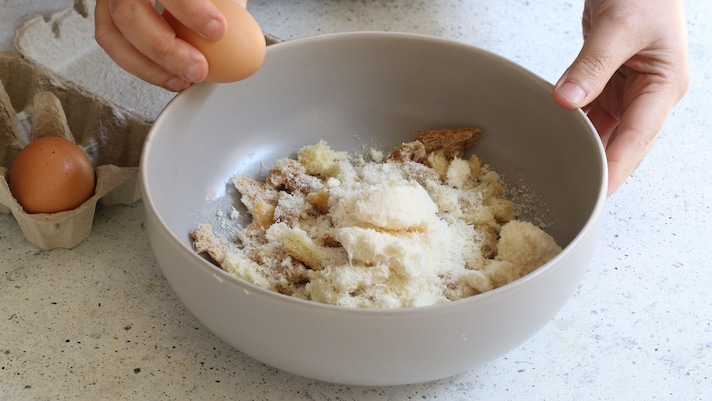
Break the bread into a bowl, soak it in a drop of milk and add the grated parmesan. Then, add the egg and mix well with a fork.
Break the bread into a bowl, soak it in a drop of milk and add the grated parmesan. Then, add the egg and mix well with a fork.
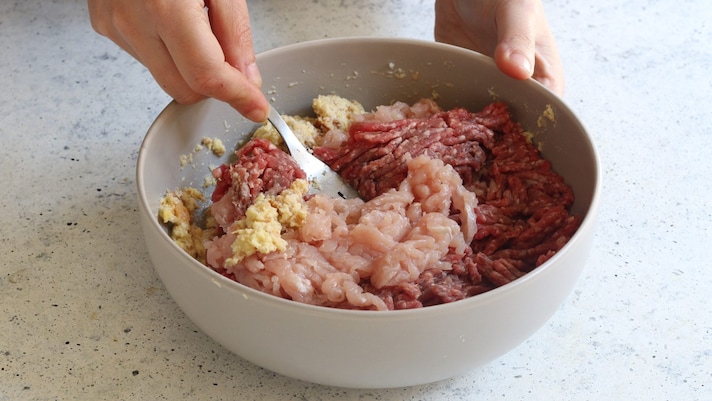
Add both types of minced meat at this point, season with salt and pepper, then knead.
Add both types of minced meat at this point, season with salt and pepper, then knead.
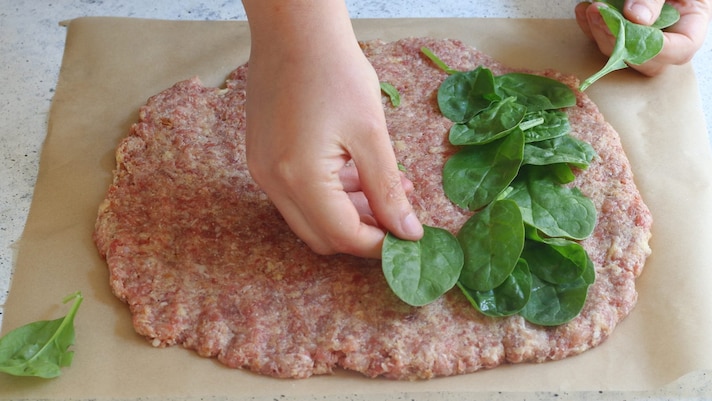
On a rectangular sheet of baking paper, flatten the meatloaf dough into an oval. Then spread the spinach leaves over the surface.
On a rectangular sheet of baking paper, flatten the meatloaf dough into an oval. Then spread the spinach leaves over the surface.
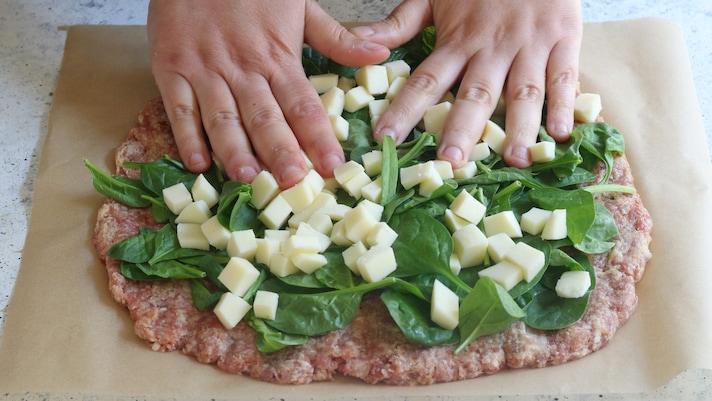
Also add the scamorza cut into cubes, then press with the palms of your hands, so that the filling adheres to the meat.
Also add the scamorza cut into cubes, then press with the palms of your hands, so that the filling adheres to the meat.
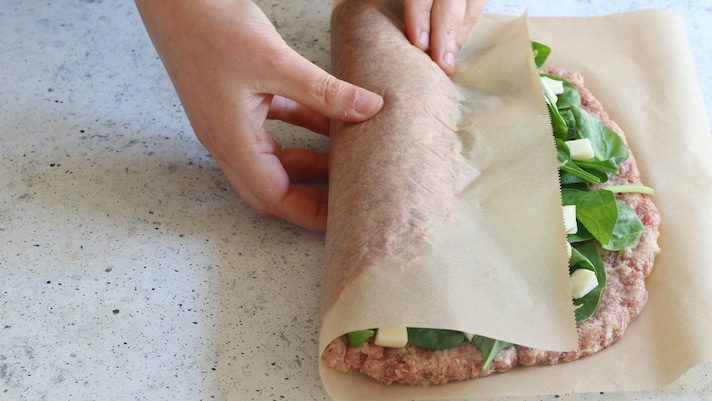
Using the baking paper underneath, roll up the meatloaf on itself, squeezing and compacting well with your hands as you roll. Wrap the meatloaf in paper and set aside in a cool place.
Using the baking paper underneath, roll up the meatloaf on itself, squeezing and compacting well with your hands as you roll. Wrap the meatloaf in paper and set aside in a cool place.
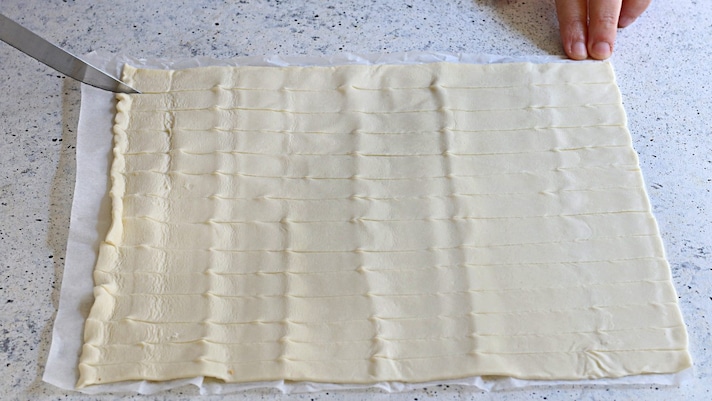
Open a rectangle of puff pastry and place it horizontally. Keep the baking paper underneath and cut the pastry to obtain regular strips, between 1 and 2 cm wide each.
Open a rectangle of puff pastry and place it horizontally. Keep the baking paper underneath and cut the pastry to obtain regular strips, between 1 and 2 cm wide each.
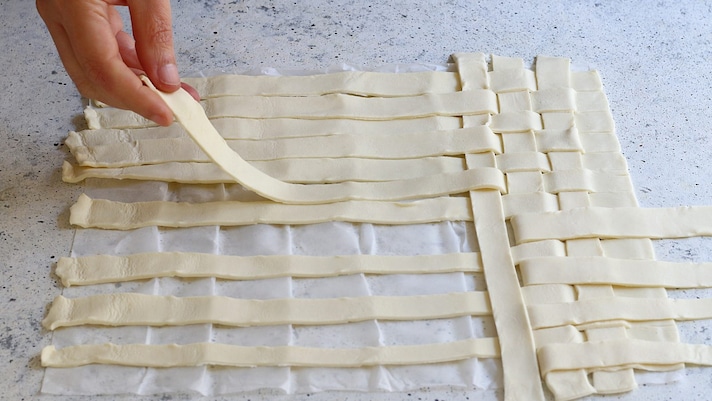
Cut out the second rectangle in the same way and use the strips obtained from it to weave them perpendicularly and alternately with the strips of the first rectangle, as if to form the weave of a basket.
Cut out the second rectangle in the same way and use the strips obtained from it to weave them perpendicularly and alternately with the strips of the first rectangle, as if to form the weave of a basket.
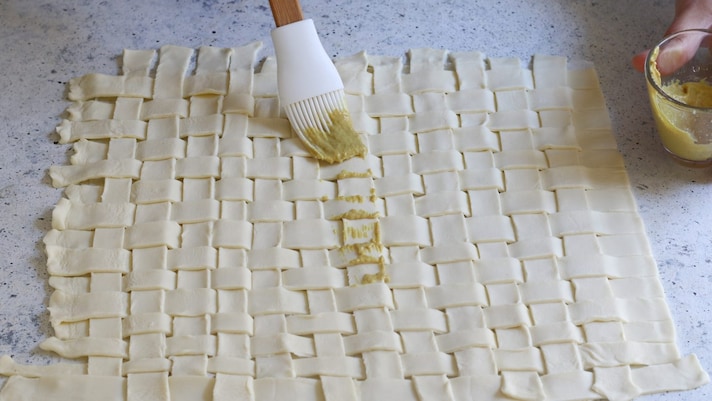
Gently brush the plait with a thin layer of mustard which will make the pastry stick better to the meat.
Gently brush the plait with a thin layer of mustard which will make the pastry stick better to the meat.
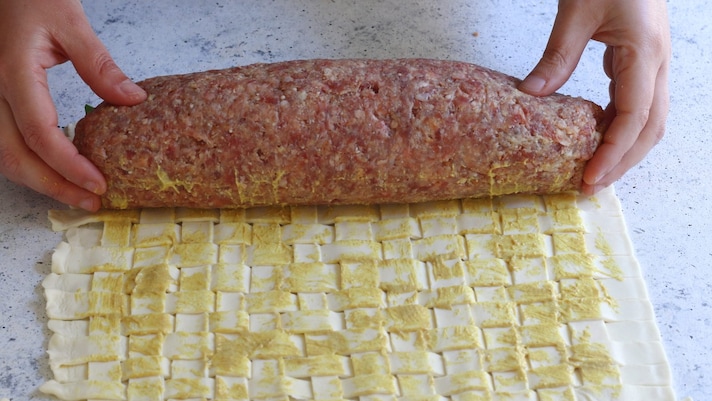
Take the meatloaf and, using its baking paper, let it slide to the base of the braided puff pastry.
Take the meatloaf and, using its baking paper, let it slide to the base of the braided puff pastry.
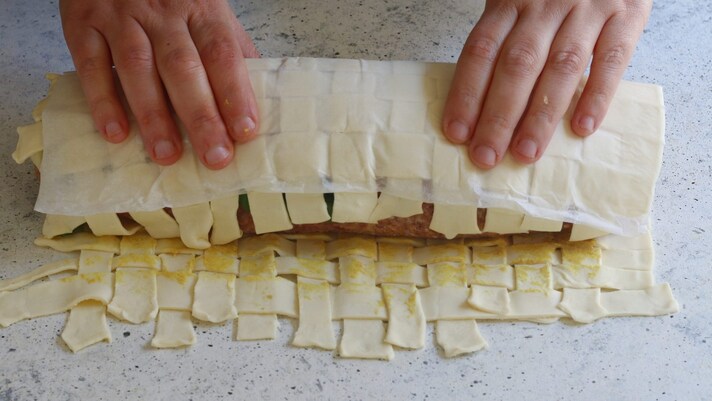
Now lift the sheet of baking paper underneath the braid and help yourself to wrap the pastry around the meatloaf with firm movements. Squeeze well by pressing with your fingertips.
Now lift the sheet of baking paper underneath the braid and help yourself to wrap the pastry around the meatloaf with firm movements. Squeeze well by pressing with your fingertips.
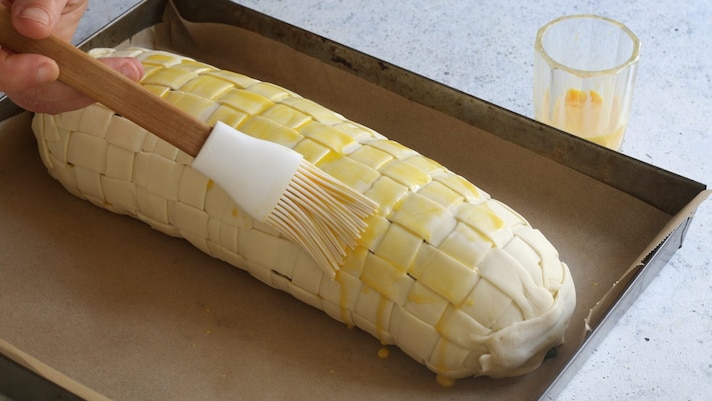
Place the wrapped meatloaf onto a baking sheet covered with parchment paper. Make sure that the sealed part is facing down. Brush the surface with the egg yolk, beaten with a drop of milk.
Place the wrapped meatloaf onto a baking sheet covered with parchment paper. Make sure that the sealed part is facing down. Brush the surface with the egg yolk, beaten with a drop of milk.
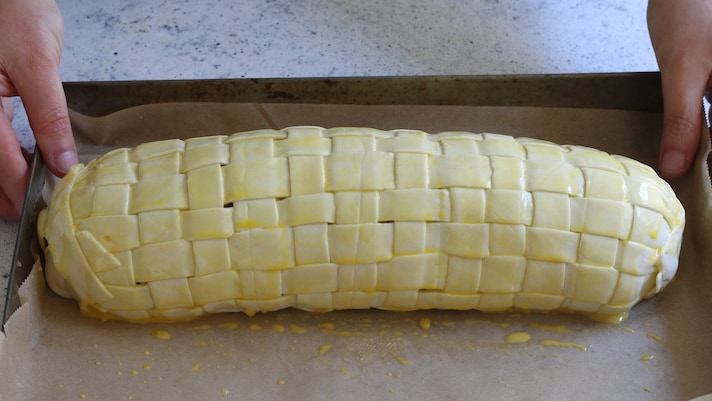
Cook on the low level of a static oven preheated to 390°F/200°C for approximately 15 minutes. Then, lower the temperature to 360°F/180°C and continue for another 45 minutes. If necessary, cover the meatloaf with aluminum foil if it gets too dark towards the end.
Cook on the low level of a static oven preheated to 390°F/200°C for approximately 15 minutes. Then, lower the temperature to 360°F/180°C and continue for another 45 minutes. If necessary, cover the meatloaf with aluminum foil if it gets too dark towards the end.
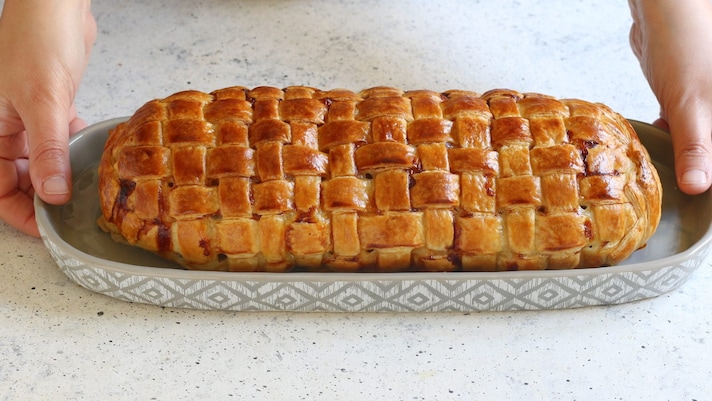
Remove the meatloaf from the oven when it appears golden brown and let it rest for about 10 minutes. Then, transfer it to a serving plate.
Remove the meatloaf from the oven when it appears golden brown and let it rest for about 10 minutes. Then, transfer it to a serving plate.
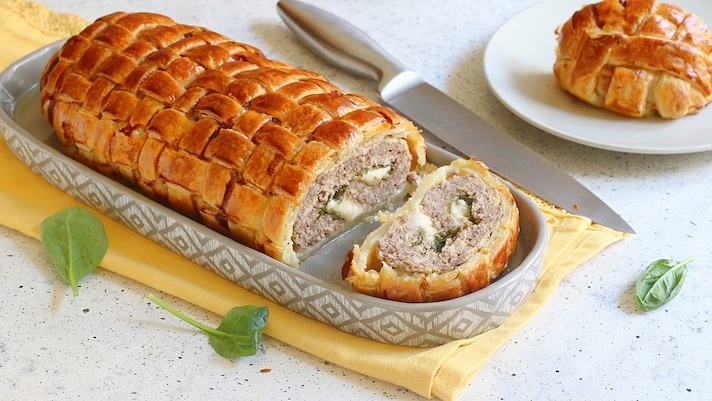
Enjoy!
Enjoy!
;Resize,width=767;)
;Resize,width=712;)
;Resize,width=712;)
;Resize,width=712;)
